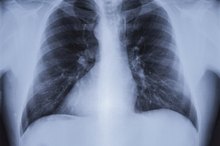High Blood Pressure Medications Without Side Effect of Coughing
High blood pressure medications may cause several side effects in patients. A dry, persistent cough is an adverse event that requires discontinuation of the drug. Medications that may induce cough are the angiotensin-converting enzyme inhibitors, such as lisinopril, enalapril and ramipril, and angiotensin II receptor blockers, such as candesartan, olmesartan and losartan. The patient should be switched to another class of high blood pressure medications.
If you are experiencing serious medical symptoms, seek emergency treatment immediately.
Diuretics
Thiazide-type diuretics are the preferred treatment in patients with high blood pressure, according to Pharmacotherapy: A Pathophysiologic Approach 1. These drugs prevent sodium from being reabsorbed into the body, allowing sodium and water to be released from the body. The thiazide-type diuretics include hydrochlorothiazide, chlorthalidone, indapamide and metolazone. Loop diuretics are a subclass of diuretics used when other medical issues exist. Bumetanide, furosemide and torsemide are loop diuretics that prevent reabsorption of sodium. These medications work at the loop of Henle in the kidney. Potassium-sparing diuretics are another subclass and include amiloride and triamterene. These drugs prevent the release of potassium and are a good choice in patients who are at risk for low levels of potassium.
- Thiazide-type diuretics are the preferred treatment in patients with high blood pressure, according to Pharmacotherapy: A Pathophysiologic Approach 1.
- Bumetanide, furosemide and torsemide are loop diuretics that prevent reabsorption of sodium.
Beta-blockers
Alternative to Metoprolol Succinate
Learn More
Beta-blockers are another class of high blood pressure medications that do not cause cough. Beta-blockers prevent chemicals from binding to beta receptors found on the heart. This leads to a decrease in the force and rate of the heart beat producing a decrease in blood pressure. The oxygen demand of the heart also decreases, allowing a further decrease in blood pressure.
- Beta-blockers are another class of high blood pressure medications that do not cause cough.
Calcium Channel Blockers
Calcium channel blockers are used in patients who have failed to treat high blood pressure adequately. The Drug Information Handbook explains that the calcium channel blockers prevent calcium from producing its effects and allows the muscles of the heart to relax. This also allows oxygen to reach the heart more effectively and lower the blood pressure. The use of these medications may be beneficial in patients who have chronic chest pain, as well.
- Calcium channel blockers are used in patients who have failed to treat high blood pressure adequately.
- The use of these medications may be beneficial in patients who have chronic chest pain, as well.
Related Articles
References
- Pharmacotherapy: A Pathophysiologic Approach; Joseph T. Dipiro, Robert L. Talbert, et al.; 2008
- Drug Information Handbook; Charles F. Lacy, Lora L. Armstrong, et al.; 2009
- Duarte JD, Cooper-DeHoff RM. Mechanisms for blood pressure lowering and metabolic effects of thiazide and thiazide-like diuretics. Expert Rev Cardiovasc Ther. 2010;8(6):793–802. doi:10.1586/erc.10.27
- U.S. National Library of Medicine, StatPearls. Thiazide Diuretics. Updated February 4, 2019.
- U.S. National Library of Medicine, StatPearls. Loop Diuretics. Updated October 15, 2019.
- Elsevier ScienceDirect. Hypokalemia: Adjuncts to Therapy. Published 2017.
- American Heart Association. Types of Blood Pressure Medications. Reviewed October 31, 2017.
- National Health Service, UK. Furosemide. Reviewed January 10, 2019.
- Johns Hopkins Lupus Center. Blood Pressure Medications (Anti-hypertensives).
- Leone A. Does Smoking Act as a Friend or Enemy of Blood Pressure? Let Release Pandora's Box. Cardiol Res Pract. 2011;2011:264894. Published 2011 Jan 19. doi:10.4061/2011/264894
- Harvard Health Publishing, Harvard Medical School. Tips for Taking Diuretic Medications. Updated September 25, 2019.
- American Heart Association. Changes You Can Make to Manage High Blood Pressure. Reviewed November 30, 2017.
Writer Bio
Karla Casco began writing in 2010, focusing her work on diseases and treatments and their side effects. She has also created patient handouts, PowerPoint presentations and journal clubs. Karla has a doctorate in pharmacy from St. John's University and holds a pharmacy license for the state of New York.









